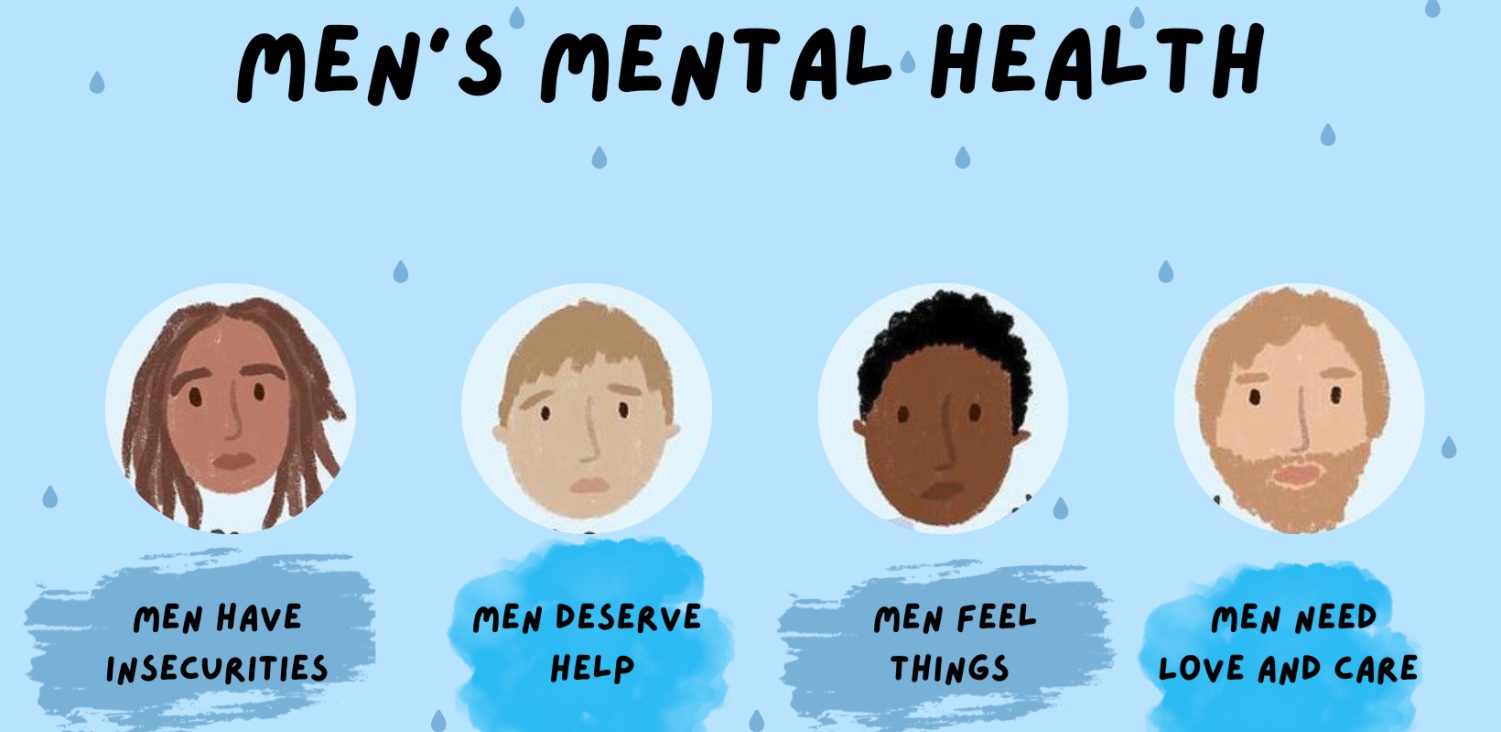\Men’s Mental Health Awareness is more important today than ever before. For too long, many men have felt pressure to appear strong, silent, and in control, often hiding struggles with stress, anxiety, or depression.
The truth is, mental health challenges do not discriminate. Men deserve the same understanding, care, and support as anyone else
By raising awareness, breaking the stigma, and encouraging open conversations. We can help men feel safe to seek help and take steps toward healthier, happier lives.

What is mental health?
That is such a complex question and there is no one definite answer.
The term “Mental health” is often used to describe depression Schizophrenia, Bi-Polar, anxiety conditions and others.
In fact the World Health organisation define mental health as ” a state of well-being in which each individual realises his or her own potential and can cope with the normal stress of life, can work productively and fruitfully, and is able to make a contribution to his or her community”.”
So that would be describing someone as having mental wellbeing.
Mental health illness is completely different.
Mental health affects not only the person who is suffering it from it but their family and friends. There are many different forms of mental health illness, and sadly it is affecting young people more and more.
Social media is having an impact on young people as bullying occurs on line on some sites.
It is quite normal sometimes to feel down, sad, distressed and anxious, but if it lasts to long and starts to affect your daily life them it’s important to have a check-up with your doctor to investigate what is going on.
Signs of being unwell mentally:
- Not enjoying doing things that you would normally do.
- Having problems with friends and family.
- Changes in your sleeping habits, and in your appetite.
- Feeling sad or down for long periods of time.
- Crying for no definite reason.
- Having difficulties with your memory and lacking concentration.
- Thinking negative or unusual thoughts.
- Feeling unusually worried or stressed. Becoming involved in risky behavior that you would normally avoid. For example, drug taking or drinking heavily.
Your work can impact you
Bullying in the workplace may cause mental stress or cause an existing condition to worsen. Stress with your work may also impact on your feelings.
Mental Health Forms
Depression
Is a form of mental health, which has a person feeling so down about life and their situation, that they can’t lift themselves out of that black cloud.
There is no real cause for depression as it’s likely an event or situation in your life has brought you to this state.
If you are feeling down more days than not in a week then there is a chance that there is something serious going on with you?
The more you feel down the more you feel like doing nothing then that feeling escalates to the point that you need help.
Help is always available, from you doctor, from Lifeline and Beyond Blue.
Bipolar
Is another form of mental health. This illness causes the sufferer to have extreme highs and lows in their moods.
People with this condition can experience moods that don’t necessarily make sense in the context of what is going on around them.
The moods are very disruptive and makes daily life very difficult. It is thought that the chemical elements in the brain are not in balance, as well, the environment and stress may cause this condition to occur.
Research has found that around 80% is genetic. People who are bipolar can maintain good quality of life given the right treatment and care.
Schizophrenia
Is a disorder where the sufferer experiences hallucinations and delusions. Characterized by abnormal thought process and unstable moods.
Sadly it is a lifelong illness that impacts on daily living. As yet there is no cure for this illness but medication is able to control it to a certain extent.
Psychoses
Is a term to describe some psychological symptoms that have an impact on a person’s perception and understanding of reality.
Unfortunately it occurs in late adolescents and in early adulthood. There is no scan to show up the symptoms of psychoses, but may be diagnosed by a mental health professional.
Some symptoms are hearing voices or seeing things that no one else can. Disorganization in thought, speech or behavior.

The benefit of staying well.
It is important for everyone to have a balance life, socializing with friends, learning new things, being productively creative.
Keeping active and fit. Is also important to have regular exercise as exercise releases endorphins into your body and they give you feeling of wellbeing.
Talk to a friend or family member you can trust if you are feeling down. Sometime just talking and letting go of the stress you are experiencing can make a world of difference to your mental wellbeing.
It may surprise you to find that the person you speak to has had similar thought and problems as you.
Work can make us feel good about ourselves, giving you a sense of purpose.
Being happy and content in your workplace makes for a healthy mental state.
Learning to identify when you are stressed is important so that you can avoid or manage stressful situations which will help you to stay well mentally.
Eating healthy, exercising regularly, getting good quality sleep are all ways to keep mentally well.
Exercise for mental health
Just get your body moving can help significantly.
- Go for a bike ride
- Work out at the gym
- Go for a walk
- Do Yoga or Pilates
Relaxation for mental health
Stimulate the brain by:
- Doing a cross word.
- Reading a book.
- Visit a museum or art gallery
- Take a wander through a market.
- Visit a friend.
- Do some gardening.
- Get a massage
Sleep will help for mental health
Getting enough sleep is crucial to good quality of life.
- Avoid using electronic equipment just before going to bed.
- No TV in the bedroom is recommended for good sleeping habits.
- Reduce the amount of caffeine or alcohol you consume.
- Try to stick to regular sleep patterns, even on the weekends,
Courage is contagious and talking about mental health helps to change negative attitudes and stereotypes
Help is available for every type of mental health illness so don’t be afraid to speak out and seek help.
Raising men’s mental health Awareness
Raising men’s mental health awareness isn’t just about starting a conversation—it’s about changing lives. When men feel supported to speak openly, seek help without shame, and prioritize their mental wellbeing.
We all benefit from healthier families, stronger relationships, and more connected communities. Remember, reaching out is a sign of strength, not weakness.
By continuing to break the stigma and encourage awareness. We can create a future where every man knows that it’s okay to ask for help and that taking care of your mind is just as important as taking care of your body.

